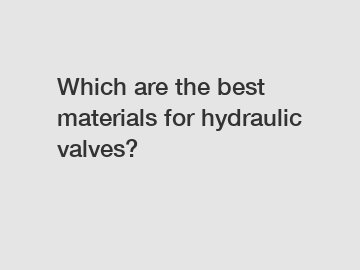Which are the best materials for hydraulic valves?
Which are the best materials for hydraulic valves? When it comes to selecting the ideal materials for hydraulic valves, several factors need to be taken into consideration. The material's physical properties, mechanical strength, resistance to wear and corrosion, as well as its compatibility with hydraulic fluids, all play a significant role in determining the best materials. Through extensive research and testing, certain materials have consistently proven to be superior in meeting these requirements.
One of the most commonly used materials for hydraulic valves is stainless steel. This material is renowned for its exceptional corrosion resistance, which is crucial in hydraulic systems that come into contact with various fluids, including water and oil. Moreover, stainless steel exhibits excellent mechanical strength, allowing it to withstand high pressures and temperatures. This characteristic is particularly important in applications where hydraulic valves are subjected to heavy-duty operations.
Another material that has gained popularity in recent years is carbon steel. Similar to stainless steel, carbon steel possesses excellent mechanical strength, making it suitable for hydraulic valves that operate under extreme conditions. Additionally, carbon steel provides good resistance to wear and tear, ensuring the durability and longevity of hydraulic valves. However, it is worth noting that carbon steel may not be as resistant to corrosion as stainless steel, and it may require additional protective measures such as coatings or plating.

Besides stainless steel and carbon steel, brass is another material commonly used in hydraulic valves. Brass offers a unique combination of properties, including excellent machinability, good corrosion resistance, and moderate strength. Its affordability also makes it a preferred choice for certain applications. However, brass may not be suitable for environments with high-temperature or high-pressure conditions, as its mechanical strength may not be sufficient in such cases.
In recent years, there has been a growing interest in utilizing alternative materials such as ceramic composites and polymers for hydraulic valves. These materials offer advantages such as high resistance to wear, low friction coefficient, and enhanced chemical resistance. Although they may exhibit lower mechanical strength compared to metal alloys, their unique properties make them suitable for certain specialized applications.
The selection of the best materials for hydraulic valves is crucial as it directly impacts the performance, reliability, and service life of the valves. Choosing materials with superior corrosion resistance ensures the prevention of valve failures due to rust or degradation. Robust mechanical strength guarantees the valves can withstand the demanding conditions in hydraulic systems. Furthermore, using materials compatible with hydraulic fluids ensures optimal performance and minimizes the risk of fluid contamination.
In conclusion, the best materials for hydraulic valves depend on various factors such as corrosion resistance, mechanical strength, and compatibility with hydraulic fluids. Stainless steel, carbon steel, brass, ceramic composites, and polymers all have their advantages and disadvantages, and the material selection should be based on the specific requirements of the application. By carefully considering these factors and choosing the appropriate materials, hydraulic system operators can ensure reliable and efficient performance, ultimately leading to improved productivity and reduced maintenance costs.
For more information, please visit Proportional Valve Overflow Valve, Electromagnetic Proportional Directional Valve, proportional solenoid valve for sale.


